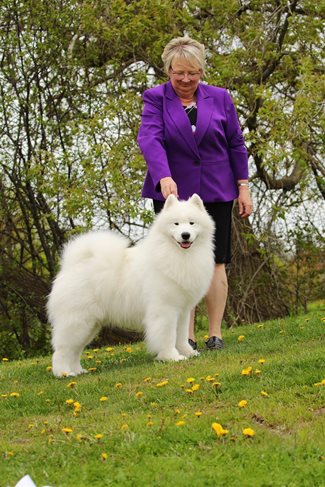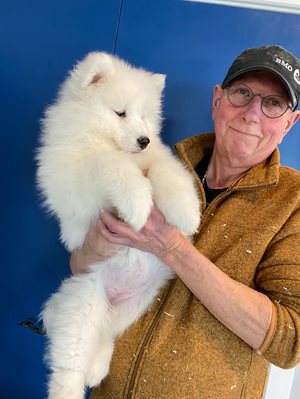When I was a child, my mother enrolled my American Cocker Spaniel “Peanut” and I in a dog obedience training course that was specially designed for. The course was taught by a man who owned 3 Samoyeds and brought them to every class to demonstrate exercises. Before the course I had never laid my eyes on a Samoyed before. I remember telling my mom that they looked like “stuffed animals and Christmas morning”! Since then, I have remained enchanted by the breed and am not alone. The Samoyed has fans around the world and for good reason - they are charming, intelligent and sensitive dogs.
Thanks to the help of CKC Member, Judge and Breeder Judi Elford of Vanderbilt Samoyeds, I’m able to share this information on Samoyeds with you. Judi has bred Samoyeds since 1977 with her husband Blair.


The Samoyed is a medium sized member of the Spitz family of dogs. In fact, the Samoyed may be the original progenitor of most of the Spitz breeds we see today as there is no record of human's "creating" the Samoyed breed from other breeds, as is seen in other purebred dogs. A quick glance at the Samoyed and one would easily and correctly guess that these dogs were bred to pull sleighs. But Samoyeds can do much more.
They are handy, all around dogs. Samoyeds herded the reindeer for the nomadic Samoyede people whose livelihood depended upon these migrating animals. The Samoyed could also pull sleds, help in the hunt, and keep the children warm in the "choom" tents that the Samoyede erected as they stopped to rest on long journeys. The breed was selected for several Antarctic expeditions in the late 1800's and early 1900's, and were brought directly from Samoyede tribes for this task. Survivors of these expeditions were then brought to England where fanciers developed a breed standard - and those original working dogs’ genes have formed what we know as the Samoyed breed today.

The earliest mention of the breed found seems to be an 1891 advert by one of the earliest developers of the breed, Mr. Kilburn-Scott of England; placed under the 'Foreign Dogs and Various' classification in the English papers. It described the dogs as : "Lovely white Russian (Samoyed) sledge dog pups, like small polar bears, most gentle and affectionate. Splendid coats and tails…". Little has changed.
"Sammies", as they are affectionately called, have outstanding temperaments from their long associations serving humans. Their gentleness and camaraderie to both children and the elderly - and everyone in between - is almost legendary. Today Samoyeds are used as service dogs, therapy dogs, pulling children on sleds, skijoring with adult owners, looking dapper at dog shows, and most importantly, cherished as beloved family pets. The eye arresting beauty of their glistening white, cream or biscuit stand-off coat is usually what makes people look twice. But then it's those exotic eyes out of antiquity and the soulful character that pulls them in. Not to mention that “Sammy Smile”.
The care of the Samoyed's coat is not complicated but a regular commitment is required, especially as they shed their dense undercoat seasonally. On the plus side though, their coat has no doggy odour. The harsh outer coat resists dirt and many people allergic to dogs are absolutely fine with Samoyeds. Breeders have tested hundreds of people with our dogs over the years, and while some allergic people do react to the breed, by far most don't.

Exercise requirements are for those of an active medium sized dog, and most Sammies appreciate as much as they can get. As long as you're with them, they're pretty content. As a socially needy breed, this is not the dog to get if you have to leave them at home for long hours daily. They are pack dogs with a strong sense of family, but also accepting of all, thriving being among others with a "the more the merrier" attitude. Loneliness can lead to noisy and destructive behaviour as Samoyeds can and do protest being left behind. Doggy daycares are perfect for working families, as they can flaunt their social nature while dog parents can rest easy knowing that their dog is not getting into trouble while home alone.
The Samoyed might be the breed for you if:
- You have an active home
- You want a trainable dog that can do a variety of dog sports
- You don’t mind speaking with strangers when out for walks ( everyone will ask about your beautiful dog)
- You have a good vacuum
- You have allergies to dogs
The Samoyed might not be the breed for you if:
- You work long and/ unpredictable hours
- You don’t want a dog that sheds
- Don’t have the time to provide your dog with mental and physical stimulation
- Can’t tolerate a vocal dog
If the Samoyed interests you, connect with Canadian Kennel Club member Samoyed breeders by using out Puppy List. www.thepuppylist.ca